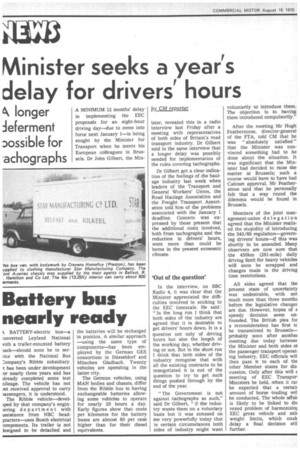Minister seeks a year's delay for drivers hours
Page 4

If you've noticed an error in this article please click here to report it so we can fix it.
ok longer
Jeferment possible for achographs
p. y CM reporter A MINIMUM 12 months' delay in implementing the EEC proposals for an eight-hour driving day—due to come into force next January 1—is being sought by the Minister for Transport when he meets his European colleagues •in Brussels. Dr John Gilbert, the Min ister, revealed this in a radio interview last Friday after a meeting with representatives of both sides of Britain's road transport industry. Dr Gilbert said in the same interview that a longer delay was possibly needed for implementation of the rules coveting tachographs.
Dr Gilbert got a clear indication of the feelings of the haulage industry last week when leaders of the Transport and General Workers' Union, the Road Haulage Association and the Freight Transport Assooiation told him of the problems associated with the January 1 deadline. Concern was expressed by those present that the additional costs involved, both from tachographs and the reduction in drivers' hours, were more than could be borne in the present economic climate.
'Out of the question'
In the interview, on BBC Radio 4, it was clear that the Minister appreciated the difficulties involved in sticking to the EEC timescale. He said : "In the long run I think that both sides of the industry are agreed that it is desirable to get drivers' hours down. It is a question not only of driving hours but also the length of the working day, whether driving or not. But in the short run I think that both sides of the industry recognise that with all the existing contracts to be renegotiated it is out of the question to try to get such things pushed through by the end of the year.
"The Government is not against tachographs as such," said Dr Gilbert, "if the industry wants them on a voluntary basis but it was stressed on me very powerfully today that in certain circumstances both sides of industry might want voluntarily to introduce them. The objection is to having them introduced compulsorily."
After the meeting Mr Hugh Featherstone, director-general of the FTA, told CM that he was "absolutely satisfied" that the Minister was convinced something had to be done about the situation. It was significant that the Minister had decided to raise the matter at Brussels; such a course would have to have had Cabinet approval. Mr Featherstone said that he personally felt that a way round the dilemma would be found in Brussels.
Members of the joint management-union delegation agreed that the Minister realised the stupidity of introducing the 543/69 regulation—governing drivers' hours-4f this was shortly to be amended. Many observers are now sure that the 450km (281-mile) daily driving Emit for heavy vehicles will soon be scrapped and changes made in the driving time restrictions.
All sides agreed that the present state of uncertainty was undesirable, with not much more than three months before the legislative changes are due. However, hopes of a speedy decision seem unfounded. The British plea fox a reconsideration has first tc be transmitted to Brussels— probably Isoon after anothei meeting due today betweer the Minister and both sides al the passenger transport operat ing industry. EEC officials wil: then pass it to each of thE other Member states for dis. cussion. Only after this will meeting of EEC Transpor Ministers be held, when it car be expected that a certair amount of horse trading wil be conducted. The whole affail is likely to be linked to tin vexed problem of harmonisini EEC gross vehicle and ax1( weight limits, which couk delay a final decision stil further.




































































































